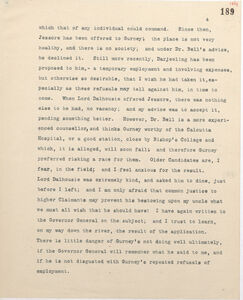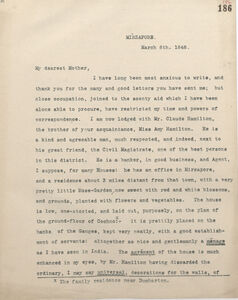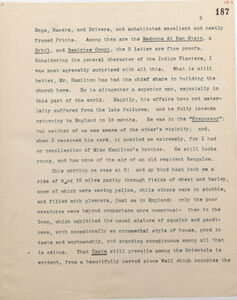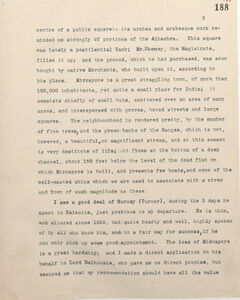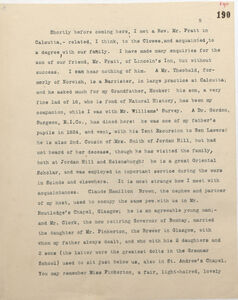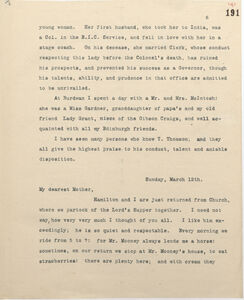Transcript
which that of any individual could command. Since then, Jessore[Jashore] has been offered to Gurney; the place is not very healthy, and there is no society; and under Dr. Bell's advice, he declined it. Still more recently, Darjeeling has been proposed to him, - a temporary employment and involving expenses, but otherwise so desirable, that I wish he had taken it, especially as these refusals may tell against him, in time to come. When Lord Dalhousie offered Jessore[Jashore], there was nothing else to be had, no vacancy; and my advice was to accept it. pending something better. However, Dr. Bell is a more experienced counsellor, and thinks Gurney worthy of the Calcutta[Kolkata] Hospital, or a good station, close by Bishop's College and which, it is alleged, will soon fall; and therefore Gurney preferred risking a race for them. Older Candidates are, I fear, in the field; and I feel anxious for the result. Lord Dalhousie was extremely kind, and asked him to dine, just before I left; and I am only afraid that common justice to higher Claimants may prevent his bestowing upon my uncle what we must all wish that he should have: I have again written to the Governor General on the subject; and I trust to learn. on my way down the river, the result of the application. There is little danger of Gurney's not doing well ultimately. if the Governor General will remember what he said to me, and if he is not disgusted with Gurney's repeated refusals of employment.
March 8th. 1848.
MIRZAPORE[MIRZAPUR]
My dearest Mother,
I have long been most anxious to write, and thank you for the many and good letters you have sent me; but close occupation, joined to the scanty aid which I have been alone able to procure, have restricted my time and powers of correspondence. I am now lodged with Mr. Claude Hamilton*1, the brother of your acquaintance, Miss Amy Hamilton. He is a kind and agreeable man, much respected, and indeed, next to his great friend, the Civil Magistrate, one of the best persons in this district. He is a banker, in good business, and Agent, I suppose, for many Houses: he has an office in Mirzapore[Mirzapur], and a residence about 3 miles distant from that town, with a very pretty little Rose-Garden, now sweet with red and white blossoms, and grounds, planted with flowers and vegetables. The house is low, one-storied, and laid out, purposely, on the plan of the ground-floor of Cochnox :- it is prettily placed on the banks, of the Ganges, kept very neatly, with a good establishment of servants: altogether as nice and gentlemanly a ménage as I have seen in India. The agrément of the house is much enhanced in my eyes, by Mr. Hamilton having discarded the ordinary, I may say universal, decorations for the walls, of
X The family residence near Dumbarton.
Dogs, Racers, and Drivers, and substituted excellent and neatly framed Prints. Among them are the Madonna di San Sisto, a Sybil, and Beatrice Cenci, the 2 latter are fine proofs. Considering the general character of the Indigo Planters, I was most agreeably surprised with all this. What is still better, Mr. Hamilton has had the chief share in building the church here. He is altogether a superior man, especially in this part of the world. Happily, his affairs have not materially suffered from the late failures; and he fully intends returning to England in 18 months. He was in the "Precursor"; but neither of us was aware of the other's vicinity; and, when I received his card, it puzzled me extremely, for I had no recollection of Miss Hamilton's brother. He still looks young, and has none of the air of an old resident Bengalee. This morning we rose at 5: and my kind host took me a ride of 8 or 10 miles partly through fields of wheat and barley, some of which were waving yellow, while others were in stubble, and filled with gleaners, just as in England: only the poor creatures were beyond comparison more numerous:- then to the Town, which exhibited the usual mixture of squalor and gaudiness, with occasionally an ornamental style of house, good in taste and workmanship, and standing conspicuous among all that is odious. That Taste still prevails among the Orientals is evident, from a beautifully carved stone Well which occupies the
centre of a public square:- its arches and arabesque work reminded me strongly of portions of the Alhambra. This square was lately a pestilential Tank; Mr.Mooney, the Magistrate, filled it up; and the ground, which he had purchased, was soon bought by native Merchants, who built upon it, according to his plans. Mirzapore[Mirzapur] is a great straggling town, of more than 100,000 inhabitants, yet quite a small place for India; it consists chiefly of small huts, scattered over an area of many acres, and interspersed with groves, broad streets and large squares. The neighbourhood is rendered pretty, by the number of fine trees, and the green banks of the Ganges, which is not, however, a beautiful, or magnificent stream, and at this season is very destitute of life; it flows at the bottom of a deep channel, about 150 feet below the level of the dead flat on which Mirzapore[Mirzapur] is built, and presents few boats, and none of the well-masted ships which we are used to associate with a river and Town of such magnitude as these. I saw a good deal of Gurney (Turner)*2, during the 3 days he spent in Calcutta[Kolkata], just previous to my departure. He is thin, and altered since 1839, but quite hearty and well, highly spoken of by all who know him, and in a fair way for success, if he can only pick up some good appointment. The loss of Midnapore is a great hardship; and I made a direct application on his behalf to Lord Dalhousie*3, who gave me no direct promise, but assured me that my recommendation should have all the value
which that of any individual could command. Since then, Jessore[Jashore] has been offered to Gurney; the place is not very healthy, and there is no society; and under Dr. Bell's advice, he declined it. Still more recently, Darjeeling has been proposed to him, - a temporary employment and involving expenses, but otherwise so desirable, that I wish he had taken it, especially as these refusals may tell against him, in time to come. When Lord Dalhousie offered Jessore[Jashore], there was nothing else to be had, no vacancy; and my advice was to accept it. pending something better. However, Dr. Bell is a more experienced counsellor, and thinks Gurney worthy of the Calcutta[Kolkata] Hospital, or a good station, close by Bishop's College and which, it is alleged, will soon fall; and therefore Gurney preferred risking a race for them. Older Candidates are, I fear, in the field; and I feel anxious for the result. Lord Dalhousie was extremely kind, and asked him to dine, just before I left; and I am only afraid that common justice to higher Claimants may prevent his bestowing upon my uncle what we must all wish that he should have: I have again written to the Governor General on the subject; and I trust to learn. on my way down the river, the result of the application. There is little danger of Gurney's not doing well ultimately. if the Governor General will remember what he said to me, and if he is not disgusted with Gurney's repeated refusals of employment.
Shortly before coming here, I met a Rev. Mr. Pratt in Calcutta[Kolkata],- related, I think, to the Clowes, and acquainted, to a degree, with our family. I have made many enquiries for the son of our friend, Mr. Pratt, of Lincoln's Inn, but without success. I can hear nothing of him. A Mr. Theobald, formerly of Norwich, is a Barrister, in large practice at Calcutta[Kolkata]; and he asked much for my Grandfather, Hooker: his son, a very fine lad of 18, who is fond of Natural History, has been my companion, while I was with Mr. Williams' Survey. A Dr. Gordon, Surgeon, E.I.Co.[East India Company], has dined here: he was one of my father's pupils in 1824, and went, with his Tent Excursion to Ben Lawers: he is also 2nd. Cousin of Mrs. Smith of Jordan Hill, but had not heard of her decease, though he has visited the family, both at Jordan Hill and Helensburgh: he is a great Oriental Scholar, and was employed in important service during the wars in Scinde[Sindh?] and elsewhere. It is most strange how I meet with acquaintances. Claude Hamilton Brown, the nephew and partner of my host, used to occupy the same pew with us in Mr. Routledge's Chapel, Glasgow; he is an agreeable young man; and Mr. Clerk, the now retiring Governor of Bombay[Mumbai], married the daughter of Mr. Pinkerton, the Brewer in Glasgow, with whom my father always dealt, and who with his 2 daughters and 2 sons (the latter were the greatest dolts in the Grammar School) used to sit just below us, also in St. Andrew's Chapel. You may remember Miss Pinkerton, a fair, light-haired, lovely
young woman. Her first husband, who took her to India, was a Col. in the E.I.C.[East India Company] Service, and fell in love with her in a stage coach. On his decease, she married Clerk, whose conduct respecting this lady before the Colonel's death, has ruined his prospects, and prevented his success as a Governor, though his talents, ability, and prudence in that office are admitted to be unrivalled. At Burdwan I spent a day with a Mr. and Mrs. McIntosh: she was a Miss Gardner, granddaughter of papa's and my old friend Lady Grant, niece of the Gibson Craigs, and well acquainted with all my Edinburgh friends. I have seen many persons who know T. Thomson*4; and they all give the highest praise to his conduct, talent and amiable disposition.
Sunday, March 12th.
My dearest Mother,
Hamilton and I are just returned from Church, where we partook of the Lord's Supper together. I need not say how very very much I thought of you all. I like him exceedingly; he is so quiet and respectable. Every morning we ride from 5 to 7: for Mr. Mooney always lends me a horse: sometimes, on our return we stop at Mr. Mooney's house, to eat strawberries: there are plenty here; and with cream they
Letter ends abruptly
1 Claude Hamilton A friend at Mirzapur
2 Gurney Turner (1813--1848). Third son of Dawson Turner, brother of Maria Hooker and Elizabeth Palgrave (both nee Turner), uncle of Joseph Dalton Hooker.
3 James Andrew Broun-Ramsey 1st Marquess of Dalhousie Governor General of India 1848-1856
4 Thomas Thomson (1817-1878) Surgeon with the British East India Company and a botanist. Later became Superintendent of the East India Company’s Botanic Garden at Calcutta.
Please note that work on this transcript is ongoing. Users are advised to study electronic image(s) of this document where possible. If users identify any errors in the transcript, please contact archives@kew.org.
Powered by Aetopia
